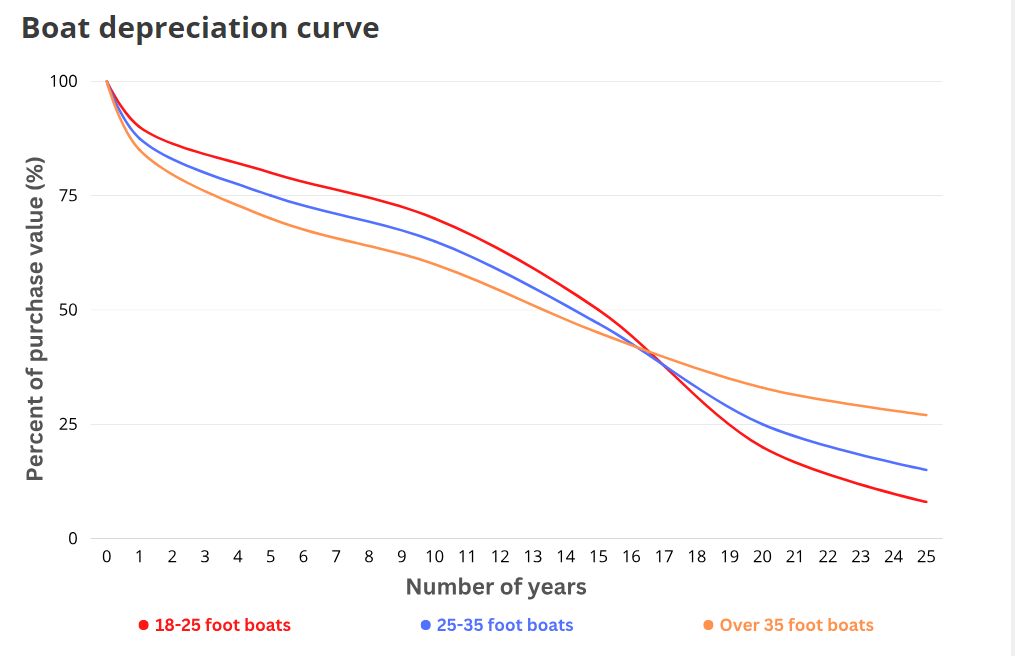A comprehensive guide to buying a used boat
The last few years have been tough for those looking to buy a pleasure craft in Canada. Supply chain interruptions have curtailed manufacturing, leaving little inventory in the market for new boats. Buying and selling used boats can be an exciting and financially savvy option for boating enthusiasts. Whether you’re a seasoned sailor or a first-time boat owner, understanding the intricacies of boat depreciation, the importance of a pre-purchase hull survey and the role of a broker are key factors to consider when purchasing or selling a used boat. We talked to Carson Thompson, a seasoned boat owner who has bought and sold several boats during his career as President of American Marine Insurance (Gibsons BC), specializing in pleasure craft insurance.
Understanding boat depreciation
Boat depreciation refers to the decrease in value that occurs over time due to factors such as age, wear and tear, technological advancements, and market demand. Depreciation rates can vary based on the type of boat, its condition, and the overall market trends. While boats typically depreciate with age, the specific depreciation curve can be influenced by factors such as brand reputation, maintenance history, upgrades, and the overall popularity of the boat model.
Scarcity of a particular boat make, or model will keep price up and sometimes beyond the original selling price if well maintained.
To learn more about boat depreciation and its impact on the market, you can refer to this informative article: Understanding boat depreciation.
Key considerations for selling or buying a used boats
When buying or selling a used boat, it’s crucial to consider several important factors. These factors can greatly impact the value, marketability, and overall satisfaction of the transaction.
Here are some key considerations:
A. Condition: The overall condition of the boat, including its hull, engine, interior, and electronics, plays a significant role in determining its value. Proper maintenance, regular servicing, and cleanliness contribute to maintaining a boat’s value.
B. Documentation: Accurate and complete documentation, including maintenance records, registration, title, and any warranty information, enhances the credibility and marketability of a used boat.
C. Price research: Conduct thorough research to understand the fair market value of the boat you’re interested in buying or selling. Online boat marketplaces, classified ads, and professional appraisers can provide valuable insights into current pricing trends.
D. Inspections and surveys: Before finalizing a purchase, consider hiring a professional surveyor to assess the boat’s condition thoroughly. Inspections can help identify any hidden issues or maintenance needs that may impact the boat’s value.
E. Negotiation and paperwork: Effective negotiation skills and attention to detail in paperwork, including sales contracts and transfer of ownership, are vital to ensure a smooth and legally sound transaction.
F. Availability of insurance coverage: Many insurance companies have limitations on the type of insurance they will sell based on the age of the boat. Do you research before you buy.
Getting a qualified pre-purchase hull survey and a thorough mechanical survey done when buying a used boat is smart buyer due diligence. When selling getting it clean and tidy with all the equipment working and the hull and superstructure waxed, and sparkling will attract a fair market value.
For more in-depth information on buying and selling used boats, this article offers a review of buying a new vs used boat: New or Used Boats: How to Decide Which Type of Boat to Buy
Who buys used boats?
The market for used boats is diverse. Potential buyers in Canada can vary depending on various factors such as geographic location, boat type, and intended use. Individuals seeking their first boat, boating enthusiasts looking for an upgrade, and those seeking a specific boat type for specialized activities (such as fishing, sailing, or watersports) are common buyers of used boats.
In Canada inventory may be limited, so knowing a broker to help locate a specific boat in the USA is a good resource to making a good decision. Additionally, boat dealerships and brokers often purchase used boats for resale.
When is the best time to buy a used boat?
Timing can significantly influence the availability and pricing of used boats. Generally, the best time to buy a used boat is during the off-season when demand is relatively lower. Many boat owners choose to sell their vessels before the boating season ends, which can create favorable opportunities for buyers. Monitoring online marketplaces, attending boat shows, and keeping an eye on local classified ads can help you find great deals.
 We asked Carson, about his latest boat acquisition, “I had a specific vessel that I wanted, a Navigator Classic 5000 made in California. There was limited stock in the Pacific Northwest and none in Canada. Accordingly, I purchased in S. California and brought it back. At that point the dollar exchange was almost in our favour, but with exchange rates where they are now, it is much more expensive to acquire a boat in the US. Although it is relatively easy to import a boat, I used a boat broker, and I obtained a pre purchase survey. Importing of the boat is relatively easy with instructions from Government web sites however it is usual to use a boat broker in the US and of course a qualified pre-purchase surveyor familiar with the conditions the used boat has been operating under.”
We asked Carson, about his latest boat acquisition, “I had a specific vessel that I wanted, a Navigator Classic 5000 made in California. There was limited stock in the Pacific Northwest and none in Canada. Accordingly, I purchased in S. California and brought it back. At that point the dollar exchange was almost in our favour, but with exchange rates where they are now, it is much more expensive to acquire a boat in the US. Although it is relatively easy to import a boat, I used a boat broker, and I obtained a pre purchase survey. Importing of the boat is relatively easy with instructions from Government web sites however it is usual to use a boat broker in the US and of course a qualified pre-purchase surveyor familiar with the conditions the used boat has been operating under.”
Buying and selling used boats can be a rewarding experience when armed with the right knowledge and insights. Understanding boat depreciation, considering essential factors when making a purchase or sale, knowing the target audience for used boats, and identifying optimal timing are key elements to ensure a successful transaction.
By exploring additional resources and speaking to individuals like Carson, who have firsthand experience, you can further enhance your understanding of the process and make well-informed decisions. Remember, buying or selling a boat is a significant investment, and conducting thorough research, inspections, and negotiations are vital steps to achieve a successful outcome. Happy boating!
